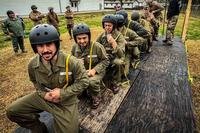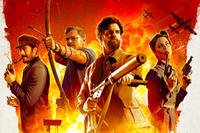Slacker Radio is the "other guy" in the streaming radio business, but they've built their reputation on human music programmers instead of the computer algorithms that fuel their competitors. Air Force veteran Jason Kurtzhals was a happy listener (and subscriber) and he approached the company with an idea to start a channel aimed at veterans where they could share their service experiences. Frontline Radio was born. Click on this link to check out the station while you read this post or download the Slacker app to your mobile device and search "Frontline Radio."
Jason talked to us about his service experience, what he's tried to accomplish with Frontline Radio and what kind of music listeners can expect to hear when they check out the station.

Explain your background, your service background, and talk about how you ended up doing this radio show.
Sure, sure. I entered the military in March 2005. I went in there initially as Security Forces, which is the Air Force's version of military police.
My first duty station was Korea. During my first year, I did base perimeter security, nothing too extravagant, just protecting resources. My second year there I was assigned to a unit called Air Force Office of Special Investigations. It's the AFOSI. There was kind of a downtown area outside of base with bars and restaurants. Our job was to patrol that area and look out for any threats, counterterrorism operations. We also had some human trafficking issues, so that motivated me to up the ante instead of just being a regular base cop.
I went into the security forces at Pope Air Force Base, which is a very, very small Air Force base in a very large and proud Fort Bragg. I didn’t really like it there too much because there was no Air Force unit, but Army guys always had to go through us to do things on our flight line. I did regular base security there.
An opportunity came up to work with Air Force OSI doing counterterrorism operations overseas for Operation Iraqi Freedom. I was trained originally as an RGO, which is kind of like a radio operator, but, towards the end of our training, they needed volunteers for the turret gunners. It’s not really a job that too many people want to raise their hand for, but I raised my hand, I was the first one to, so I was assigned to a .50 cal, which is the heaviest weapon that the Air Force uses. And I trained on that at Fort Dix, New Jersey. And let's see, I was at Fairchild Air Force Base, did a lot of training with it, went overseas, deployed with -- it was Detachment 249 for Air Force OSI and our job was basically to provide security for them while they conducted meetings within the city.
We worked with the 7th Group Alpha Team out of Fort Bragg on a couple missions, which is a special forces unit. We did a lot of joint collaborations with Navy EOD. You know the Marine was there, I'm not sure what unit it was, so I don’t want to misquote and say a different unit or company that was there. So it was really cool to kind of integrate and work with all the services instead of just being strictly limited to the Air Force.

While over there, I was a .50 cal gunner, went on over 150 missions, had a couple incidents where you had to use escalation of force, nothing too crazy, so just mainly deterring vehicles from getting too close to our convoy. We had a couple incidences within villages, in terms of security and personnel that we were looking for.
And then, yeah, I did my deployment, came back home. We listened to music over there every single day. Each truck had kind of like their own individual playlist. And even when I got done for the day, I always went back to my room and listened to music and everything, so when I came back I kind of had, you know, I don’t want to call it PTSD because I think that term is overused, but I definitely had some separation depression from the military because I didn’t really know what to do with my life.
And then I came across Slacker Radio and in doing so I was able to type in songs that I had listened to overseas and boom, right there, they were already uploaded to a playlist. I could create a custom one.
After doing that for about five years, I subscribed to Slacker Premium, that way I could listen to all my favorite songs without commercials. Then I emailed Slacker one day saying, “Hey, why don’t we get a bunch of service members together to tell their story about the songs that meant the most to them while overseas and see what happens?”
Initially it was kind of thrown around, a “contact this guy, contact that guy” kind of deal. Then I got a hold of Kevin Stapleford, Slacker’s VP of programming, who has been more than a blessing to this whole project. He said, “Yeah, let's run with this, let's see what you got.”
We built this from the ground up, literally from “What's the name of the station?” to “Well, if you want to do this, get your ass in the recording studio and tell me what you want to do.”
I went to the recording studio, gave them names, gave them different resources to contact to try to get more veterans interested. We launched on the 4th of July of this year and we fashioned two minor re-releases for the Air Force's birthday and then for Veterans Day. It just keeps growing.

You said you listened to a lot of music when you were deployed. What was the music that meant the most to you while you were serving overseas?
You had the stereotypical stuff that was popular during the 2008/2009 era. Everyone was still pretty patriotic at that point, so you still had artists coming out with songs that were dedicated to the troops.
I had a lot of Metallica, I had a lot of Bob Seger just because they were things that I remember listening from home, but also also motivated me. Disturbed was also on there a lot. Five Finger Death Punch, they weren't really popular or big back then, but some of their indie stuff was out and we listened to them. Black Sabbath was a big one for me.
But with all that stuff that I liked, you also had to take into account that there were other guys in your truck. So I had two other guys with me, I had a navigator and a driver, and they were able to decide what they wanted to listen to every other day or so. One driver was from New York, so he listened to a lot of hip-hop, R&B, old-school rap, which was really, really cool because it opened up a whole new genre of music for me. So Tupac, Biggie, Wu-Tang. I'm not too fond of them myself, but the songs that we did listen to stuck with me. My truck commander was more of a classic rock kind of guy: Stealer's Wheel, War, Black Sabbath, Boston. CCR was a big one for him too, so we had a lot of variety all through the truck.
What's cool about Frontline Radio is that when you turn it on it's like you get pop, you get country, you get R&B, you get hip-hop. There's no specific genre it fits into and some of the songs are so obscure, but they all meant something to service members over there and that’s what's really important about the station.

Is your Slacker station programmed by a computer or a person?
What sets us apart is that they actually got a veteran to come in who had these stories and these ideas. I was able to record my personal stories, I wasn’t reading from a script. It was very much off the cuff. Kevin wanted was to me record it like I was talking to a friend.
Some of the other deejays will read the stories that are submitted from service members. I know there's a push to get more service members into the recording studio. I’ve tried to get some of my buddies to do it, but there were scheduling conflicts with deployments, so we haven’t yet.
Moving forward we're gonna try to get actual veterans to come in and sit down and tell their stories, just so you hear the story from the actual person who lived it. It doesn’t get much more real than that, when you actually hear the voice of the person telling their story about what actually happened.
In a couple of my stories, I choke up a little bit or I'll stumble across my words or I have a paused moment where I have to really sit there and reflect on what I'm about to say. I don’t think there's much more of a real radio experience than that, so that definitely sets us apart from the competition.

When someone downloads a Slacker app and listens to Frontline Radio, are they going to hear the stories mixed in with music?
Yes. If someone goes to Slacker right now, they can listen to Frontline Radio for free. You can obviously pay for a higher subscription where you can skip as many songs as you like, but when you first punch in Frontline Radio you hear my voice introducing the station, telling you that I'm a veteran, and this station was built by veterans for veterans and other people to get an idea of what it was like there on the battlefront.
We don’t discriminate. Hey, you could have been in a non-warzone, but if you serve your country and you're proud of it, then we want to hear what you actually did. It doesn’t matter if you're Army, Navy, Air Force, Marines, Coast Guard, or if you were in Korea, Japan, Iraq, Afghanistan. If you served your country and a song meant something to you, we want to hear about it. There's no discrimination on that end of it.
You'll hear me and then you'll hear the real stories that are submitted. If there are any veterans reading this, all they have to do is email Slacker Radio and you can submit your story, too. They provide the email right there on the website and on the station.
You don’t have to be a service member. Some of the stories that we've heard have been from family members who lost someone. It can be a wife or brother or mother or father or cousin with a story: “When my significant other came back, this is what happened to them. They're gone now, but I want their memory to live on through this music.”
Are there any stories that have a big impact on you?
After we put this out online on Slacker Radio, Facebook, and I did a other interviews, well you know people online, they act really tough from their armchair, so they can say some pretty hurtful things. I don’t have Facebook or Instagram or anything like that, so I don’t really have a lot of exposure to the online community. I was feeling down one day. A lot of these people were saying things like “Why is an air force guy doing this? This is ridiculous, get a Marine to do it. Air Force guys don’t do shit over there.”
I don’t want to get into a pissing contest with anybody. Hey, there were guys who did more than us and guys who did less than us. I told Kevin that story and he emailed me about a guy who had been suffering from PTSD and he needed an outlet and this station was a place where he could hear other stories that people were either having struggles with or were sharing their good memories from deployment. He submitted a song called “Dear PTSD.” He said he's doing a lot better now because of what we put together, so that was pretty awesome to hear, so that lifted my spirits quite a bit.
We think this is a station for all veterans. The deejays are reading story submissions from guys who were in Vietnam and women who were in Afghanistan. We’ve even had one from a young kid whose parents died who was in Kuwait. You're getting such a unique listener experience because you're hearing people talk about music that carried them through such a hard time or it was a memory that they'll carry until the day that they die, just from a song.
And you get to hear that and you get to hear that story and then hear the song that's paired with it immediately after you hear the story. So I know listening to the station I cried a couple times and I'm not afraid to admit it either, hearing someone else's story or reusing one of my own.
I've gotta be honest, listening to anything else has never really brought up that much as an emotion from me.

I’m a big fan of Slacker myself. I’m a subscriber.
There was an article released in PC Magazine where Slacker won the best downloadable online streaming music. That was pretty awesome to read because I get their newsfeeds and stuff like that, so that was awesome.
I’d like to do this type of format with other ideas as well. I'm a farmer by trade, so a country music station where farmers submit their stories about country music would be great. They could go a hundred different ways. It's not just for veterans. The best thing about Slacker is that I emailed, I got a response, and something was built from an idea from an actual listener. If you want to call Slacker Radio “personal radio,” there's the perfect example right there.
One last thing. For the station breaks in-between songs, we looked at a few different resources for veterans like Hire Heroes USA, an outlet for veterans who are looking for a job. We definitely promote not just the stories and songs behind the service members who were there, but we also have five or six different resources that the station promotes for veterans outreach, whether it be for jobs or for help with PTSD or whatever it may be. So even if you listen to the station and you don’t particularly care for the music, you might hear something that will help you in a time of need.




